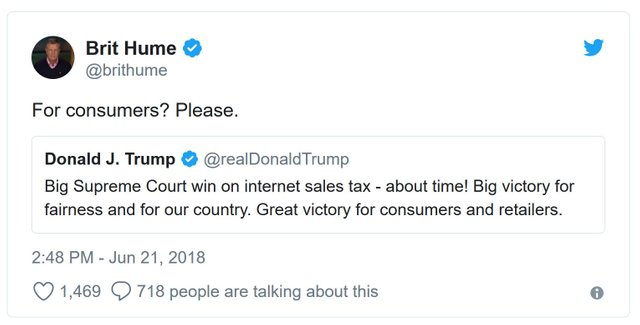U.S. Supreme Court Silently Passes Law -- Internet Tax Collection -- Will Kill Small Businesses
 By Aaron Kesel
By Aaron Kesel
U.S. President Donald Trump has vowed to drain the swamp in Washington, DC and claims to be for the people, so much so that he just encouraged imposing yet another tax on American citizens' backs by raising corporate retail prices. A new Internet collection tax will allow states to collect -- (steal, rob, plunder) [taxation is theft] you get the point -- from any retailer across the U.S. who sells products online. In short, the newly approved law will kill small businesses.
"For us, an internet sales tax would mean the certain end of our business," one family who owned a trading card shop wrote in USA Today.
Another small business owner wrote in The Wall Street Journal that it takes her an entire business day each year to pay in-state taxes. She emphasized that if she had to do this for the other 44 states with sales taxes as well, she’d lose 45 business days a year.
To detail what's happening, we need to go back to 1967 when the Supreme Court first set what was known as the "physical presence" standard in its Bellas Hess decision. The idea was that states and localities could only tax a sale if the business conducting it had some kind of brick-and-mortar establishment within the state's own borders. Back then, this applied to almost all transactions.
The Court revisited the issue in 1992 with the Quill ruling. By then, the growth of mail-order catalogs was raising the question of sales where the customer certainly has a physical presence in a state or municipality, but the business does not. Still, it was a minor enough problem that the Court reaffirmed its previous ruling. A few years later, in 1998, Congress effectively codified the Court's "physical presence" standard into law.
Then the Internet was invented and online stores were created for consumers to purchase goods and receive them directly to their doorsteps.
Here's where things get interesting and should make you think about why allowing states to tax all Internet purchases by businesses not in those states is a bad idea. Nineteen of the 20 biggest online retail chains, including Apple, Target, Macy's, and Walmart, already collect sales taxes from all their customers who purchase products online.
While major online retailers — like Overstock, Newegg, and Wayfair — still don't collect sales taxes. Obviously, this gives these companies a competitive advantage against the bigger online retail stores.
Trump is undoubtedly targeting Amazon because it applies sales taxes to its own transactions; but it also serves as an online platform for third-party vendors, who often don't collect any sales taxes. This is as much as half of Amazon's business. The lack of a sales tax on those transactions helps Amazon, and it obviously helps the smaller online businesses working with Amazon to grow their online stores.
President Trump has previously urged the U.S. postmaster general to double shipping rates for Amazon.com and other companies amid months of his continued criticism that the online retailer is costing the Postal Service "billions" of dollars in revenue.
South Dakota v. Wayfair wasn't just the states against online retailers, it pitted some of the largest online retailers against others. And it made the large online retailers question what to do when collecting sales taxes against the smaller business who don't.
The new decision by the Supreme Court doesn't just mean all those small businesses with online sales will now lose more revenue to taxes. It means they'll also have to spend money on systems that can keep track of their various tax obligations. That's 45 states, each with its own particular sales tax law with different rates, not to mention many, many more city and local government sales taxes. This means that online small or not so small businesses will have to comply with more than over 10,000 state and local taxing jurisdictions, Associated Press reported.
The court ruled on the 2016 law passed by South Dakota, which said it was losing out on an estimated $50 million a year in sales tax not collected by out-of-state sellers. Legislators in the state, which has no income tax, passed a law designed to directly challenge the "physical presence" ruling. The law requires out-of-state sellers who do more than $100,000 of business in the state or more than 200 transactions annually with state residents to collect sales tax and send it to the state.
Chief Justice John G. Roberts Jr. dissented, ZDNet reported.
Any alteration to those rules with the potential to disrupt the development of such a critical segment of the economy should be undertaken by Congress. The court should not act on this important question of current economic policy, solely to expiate a mistake it made over 50 years ago.
Aaron Kesel writes for Activist Post. Support us at Patreon. Follow us on Facebook, Twitter, Steemit, and BitChute. Ready for solutions? Subscribe to our premium newsletter Counter Markets.

Interesting article, thanks for sharing and it's definitely something to be aware of in this war against us on all fronts.
When you let the Sith Lords run the world from behind the scenes.